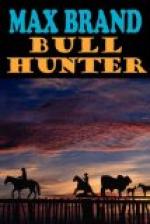“No, Pete, of all the fools—”
Bull waited to hear no more. He stole back to the table on the far side of the room sick at heart and sat down to think or try to think.
The truth came to him slowly. Pete Reeve, whom he had taken as his ideal, was, as a matter of fact—he dared not think what! The blow shook him to the center. But he had been living on the charity of Reeve. He had been draining the resources of the generous fellow. And how would he ever be able to pay him back?
One thing was definite. He must put an end to any increase of the obligations. He must leave.
The moment the thought came to him he tore a flyleaf out of the book and wrote in his big, sprawling hand:
Dear Pete:
I have to tell you that it has just occurred to me that you have been paying all the bills, and I’ve been paying none. That has to stop, and the only way for me to stop it is to go off all by myself. I hate to sneak away, but if I stay to say good-bye I know you’ll argue me out of it because I’m no good at an argument. Good-bye and good luck, and remember that I’m not forgetting anything that has happened; that when I have enough money to pay you back I’m coming to find you if I have to travel all the way around the world.
Your pardner,
BULL
That done, he paused a moment, tempted to tear up the little slip. But the original impulse prevailed. He put the paper on the table, picked up his hat, and stole slowly from the room.
CHAPTER 13
He went out the back door of the hotel so that few people might mark his leaving, and cut for the woods. Once in them, he changed his direction to the east, heading for the lower, rolling hills in that direction. He turned back when the lights of the town had drawn into one small, glimmering ray. Then this, too, went out, and with it the pain of leaving Pete Reeve became acute. He felt lost and alone, that keen mind had guided him so long. As he stalked along with the great swinging strides through the darkness, the holster rubbed on his thigh and he remembered Pete. Truly he had come into the hands of Pete Reeve a child, and he was leaving him as a man.
The dawn found him forty miles away and still swinging strongly down the winding road. It was better country now. The desert sand had disappeared, and here the soil supported a good growth of grass that would fatten the cattle. It was a cheerful country in more ways than the greenness of the grass, however. There were no high mountains, but a continual smooth rolling of hills, so that the landscape varied with every half-mile he traveled. And every now and then he had to jump a runlet of water that murmured across his trail.
A pleasant country, a clear sky, and a cool wind touching at his face. The contentment of Bull Hunter increased with every step he took. He had diminished the sharpness of his hunger by taking up a few links of his belt, but he was glad when he saw smoke twisting over a hill and came, on the other side, in view of a crossroads village. He fingered the few pieces of silver in his pocket. That would be enough for breakfast, at least.




